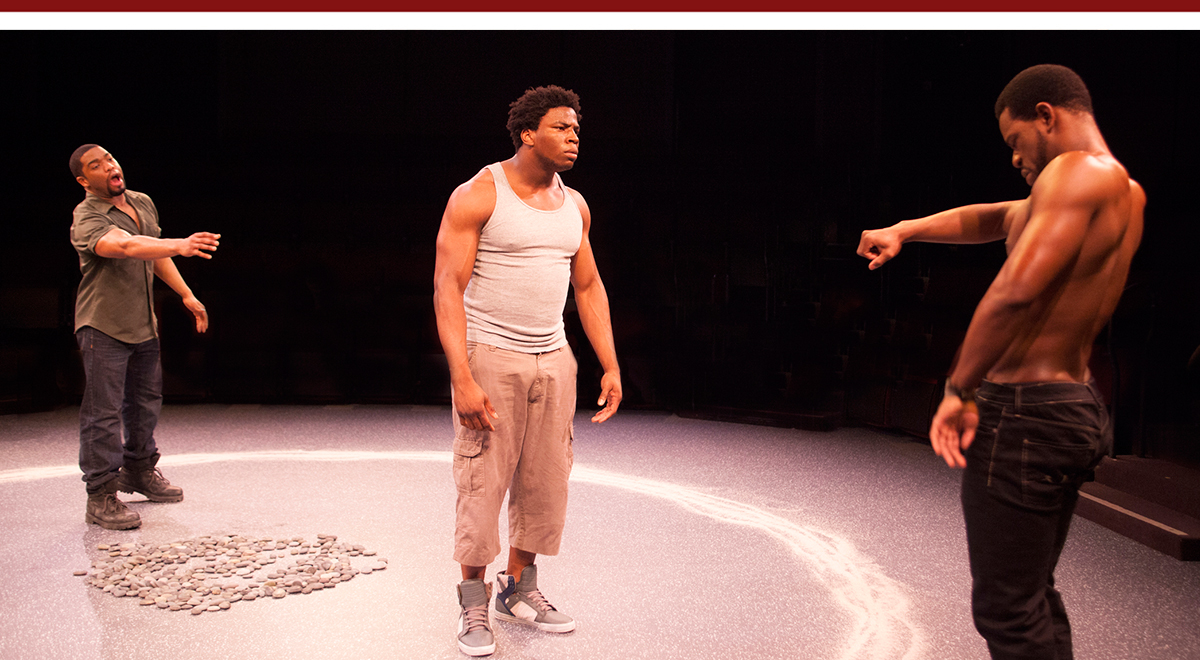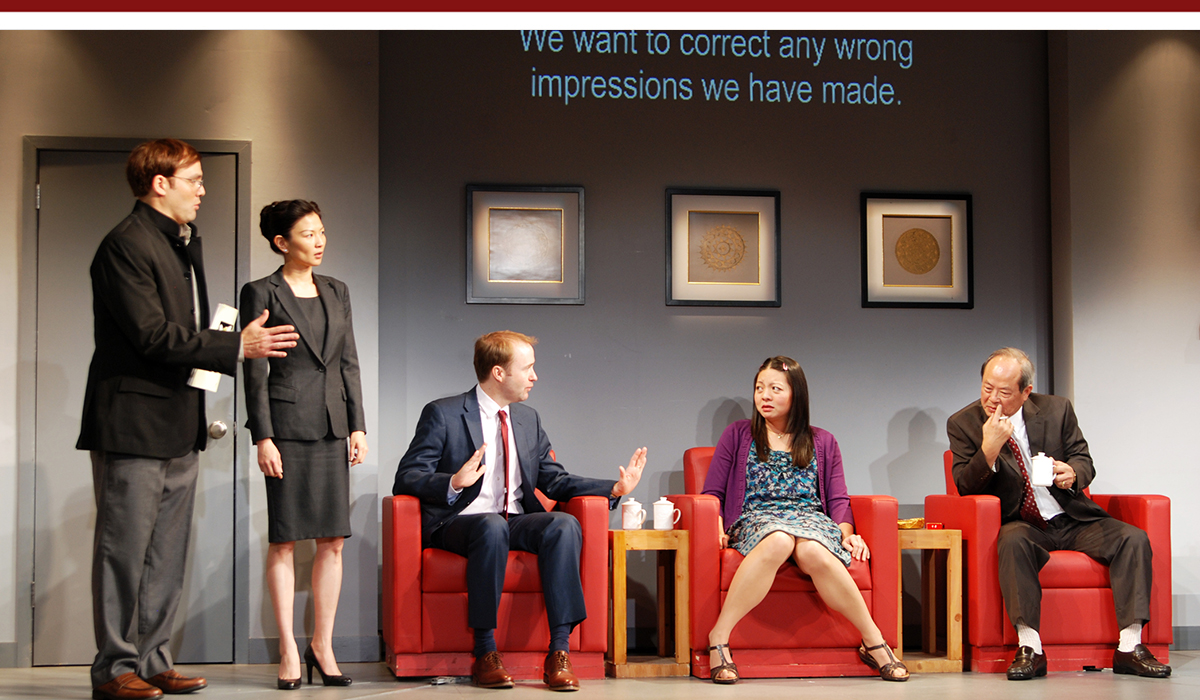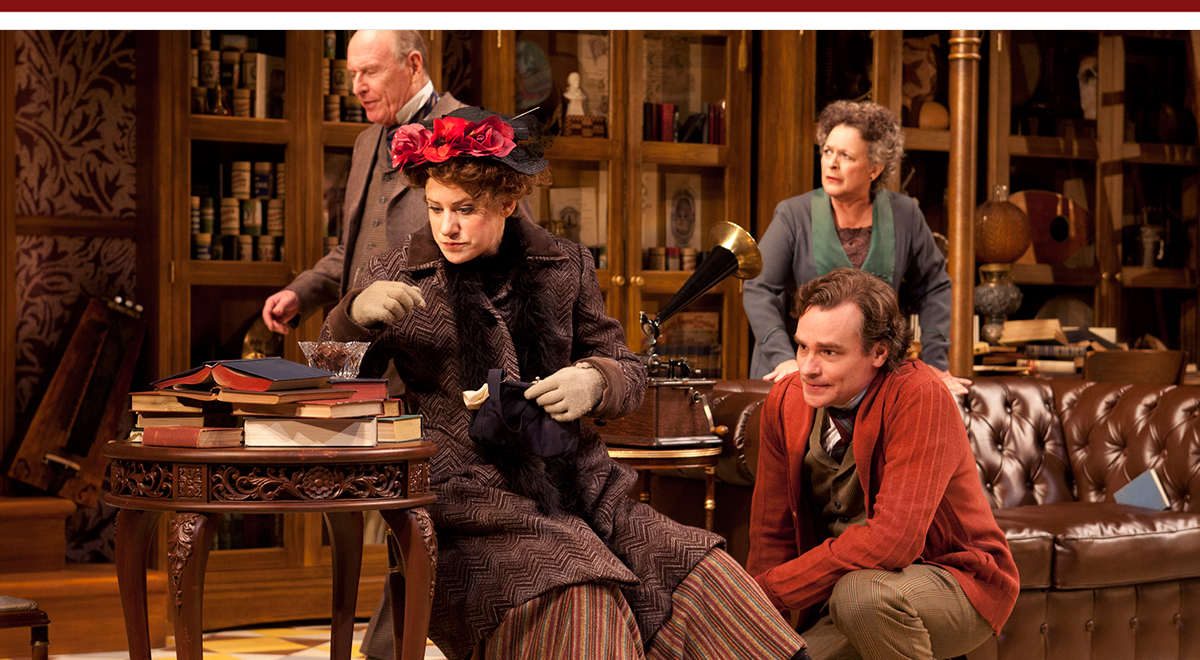FEBRUARY 2013
Click title to jump to review
BACKBEAT by Marc Camoletti | Ahmanson Theatre
THE BROTHERS SIZE by Tarell Alvin McCraney | South Coast Repertory
CHINGLISH by David Henry Hwang | South Coast Repertory
PYGMALION by George Bernard Shaw | The Old Globe
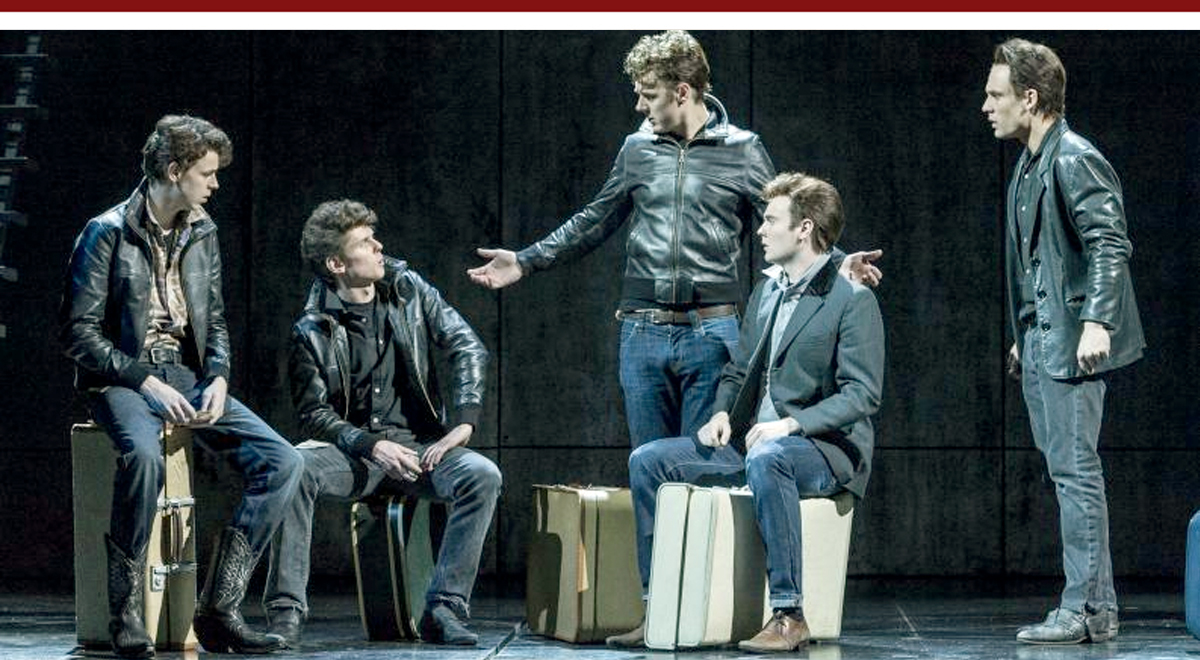
The Beatles' big bang
The Beatles' influence was incalculably greater than the sum of the parts. That means any look back at what launched their meteoric rise will confront a mystery. Why did the convergence of these seemingly ordinary working class lads from Liverpool cause popular music's Big Bang?
Backbeat, The Birth of The Beatles, currently at the Ahmanson Theatre through March 1, is a stage musical based on the successful 1994 film of the same name. Adapted by Iain Softley and Stephen Jeffreys from the screenplay by Softley, Michael Thomas, Stephen Ward, something was lost in translation.
In the film, the musical performances blend into montages that deepen the narrative. Here, as isolated stand-and-deliver numbers, they interrupt it. The songs The Beatles' embraced during their formative years, before they began writing their own music, are now generic-sounding rock'n'roll covers, and the performances, while the actor-musicians do their best, can only go so far to turn us jewelry-rattlers in the cavernous Ahmanson into a frenzied nightclub crowd. Still, despite a mix that does recalls the poor acoustics of a small club, the cast does recapture the magic on several tunes. David Leveaux directs, after Softley's original staging.
The storyline upon which the songs are strung recounts the embryonic early years living in Liverpool and then honing their sound in Hamburg. That narrative, in turn, is woven around the less-known story of the band's first bassist, Stuart Sutcliffe (Nick Blood), John Lennon's best friend and soul mate. Before Paul McCartney (Daniel Healy) played bass and became forever linked with Lennon (Andrew Knott) as a co-songwriter, Sutcliffe was a "fifth" along with John, Paul, George, and first drummer Pete Best (Oliver Bennett).
When Lennon's group The Quarrymen began to generate a following in their hometown of Liverpool, he enlisted Sutcliffe to play bass, showing him how easy it was to play the songs' rudimentary progressions. Sutcliffe would be an unenthusiastic part of the show, but his aloofness and good looks attracted the most women. He is credited here with suggesting changing the name to The Beatles as well as some image improvements. But his heart was in painting, and by all accounts [see links to biographies at end of review) he would have been a famous painter had he never known Lennon. When he met charismatic German photographer Astrid Kirchher (Leanne Best), through artist-musician Klaus Voorman (Dominic Rouse), she recognized his genius and began nurturing his artistic ambitions. They fell in love, moved in together, and Sutcliffe began to miss shows and recording dates. This threatened the band's success, and infuriated Lennon, who took it as a personal slap.
Then, as he had separated from the band for good, he died of a cerebral hemorrhage at age 22.
Despite all the big Broadway production values, the relationship at the heart of Backbeat is an intimate triangle about two immensely talented, working class friends and the woman who helps them see they must split up to achieve their individual potential. But that story is necessarily abbreviated to make room for the more familiar story of the band, and of course, all the music. To do it justice, the Sutcliffe-Lennon-Kirchherr story needs more attention, and explore the backstory behind Lennon's insistence that Sutcliffe participate, and the horrible losses of uncle and mother that made Sutcliffe's abandoning the band so devastating to his best friend. It would help explain the mysterious bitterness and anger Lennon exhibits throughout the show, as well as his stinging and caustic humor. More importantly, it would signal the the devastating impact Sutcliffe's death would have on Lennon, and go a long way to answering the mystery of The Beatles' explosive success.
The other fascinating part of The Beatles' story, barely touched upon, is how they would begin to move away from cover songs through the developing songwriting of Lennon, McCartney, and George Harrison (Dan Westwick) and production of George Martin (James Wallace). We do have a single scene of Paul and John working together on an original. But again, it feels abbreviated and tacked on.
Credit Best and Blood with giving their heart-breaking relationship intimacy and depth. And kudos to all the band members–Knott, Healy, Blood, Westwick, Bennett, and, briefly at the end as Ringo Starr, Adam Sopp– who handled the challenging assignment of acting, singing, and playing their instruments.
Unfortunately, without more help from the writers, Backbeat's musical and storytelling strands fail to mesh, and lasting memories of the show "seem to vanish in the haze."
For more on the story behind the play, view a BBC documentary on Sutcliffe, The Lost Beatle, currently available on Youtube in four parts: 1, 2, 3, and 4. There is also a version of the story produced by Dick Clark, also called The Birth of the Beatles.
top of page
BACKBEAT
Adapted for the stage by IAIN SOFTLEY
and STEPHEN JEFFREYS
based on the Universal Pictures Film written by
IAIN SOFTLEY, MICHAEL THOMAS
and STEPHEN WARD
musical supervision/original incidental music
by PAUL STACEY
directed by DAVID LEVEAUX
from IAIN SOFTLEY’s production
for Glasgow Citizens Theater
AHMANSON THEATRE
January 20 – March 1, 2013
Opened 1/30, rev’d 2/2e
CAST Oliver Bennett, Leanne Best, Nick Blood, Daniel Healy, Andrew Knott, Dan Westwick, with Edward Clarke, Josie Dunn, Sam Ford, Mark Hammersley, Perry Ojeda, Charlotte Palmer, Phil Pritchard, Dominic Rouse, Louise Shuttleworth, Adam Sopp, Charles Swift, James Wallace, Miranda Wilford
PRODUCTION Andrew D. Edwards, design, based on concept by Christopher Oram; ESosa, costumes; Howard Harrison/David Holmes, lights; Richard Brooker/Poti Martin, sound; Timothy Bird/Nina Dunn (Knifedge), projections; Ken Roht, choreographer, Ray Gin, stage management
HISTORY The original production of Backbeat opened at the Citizens Theatre, Glasgow, in February 2010. This production premiered at the Duke of York’s Theatre, London, in September 2011. Los Angeles Executive Producer is Paul Elliott, for Triumph Entertainment LTD.
Dan Westwick, Oliver Bennett, Andrew Knott, Nick Blood, and Daniel Healy
Craig Schwartz
The power of myth
Tarell Alvin McCraney's The Brothers Size tells a woefully familiar story in a wholly unfamiliar way. With African character names, movement that evokes ritual, and symbolism in both story and scenic design, the struggles of two-African American brothers and a shadowy friend resonate with the power of myth. Tea Alaric's staging at the Old Globe (through February 24), and a commanding cast, give timelessness to this tale of trapped lives.
Through these devices a sense of ancient storytelling is heightened, and specifics of location, personalities and relationships, histories, and recent events take shape almost secondarily. The dialogue adds to the amorphous quality with occasional poetic flourishes ("I glide like the moon") and regular out-of-character asides that describe obvious actions ("I enter the room"). The effect provides perspective. More importantly, splitting each character into a first-person participant and a third-person observer adds to the play's allegorical quality.
Peter Ksander's bare set invites Zen meditation. The walkway around the Sheryl and Peter White Theatre stage has become part of the stage floor, by neutral-colored carpet that extends under the front row that surrounds the stage. Dead center is a two-foot-wide circle of smooth stones. One character carrying a leaking pail trails a circle of light sand that is soon fitted by a pool of Designer Gina Scherr's light. This will be the world the brothers share. Elegba will rarely enter, but roam around it like a coyote waiting his moment.
Alaric's impressionistic staging complements the writing and creates a fluid presentation that pulls us in as we fill in the details of car mechanic Ogun Henri Size (Joshua Elijah Reese) trying to help his younger brother Oshoosi (Okieriete Onaodowan) get on his feet and back into the family after being released from prison.
Oshoosi experiences the familiar pull of an insistent brother who offers drudgery as the necessary road to security, and the sweet escape of his charismatic friend and fellow former inmate Elegba (Antwayn Hopper), who offers easy money and getting high instead of security.
How Oshoosi will navigate these opposing influences is at the heart of Brothers Size. Along the way, he will recall their family's struggles, stories of their past, and of women they knew. The women's stories are also familiar: surprise pregnancy, mockery and rejection, summoning extraordinary–yet unacknowledged–strength.
Accomplishing the technique and making it work and making it real and their characters real and palpable are three actors. Providing just enough detail to create their characters, but leaving enough mystery to foster the mythic, is a tough balancing act that Hopper, Onaodowan, and Reese get right.
Costumer Michelle Hunt Souza has a nice touch in brother Ogun's shirt, one of the only places she has to make any statement, and its dark drab green perfectly represents the gas station owner, mechanic, soldier, worker, that, in turn, Ogun represents. Music by Melville, who is stationed in a corner of the stage to perform an array of percussion, primarily conga underscoring, and sound designer help add dimension.
There is great tradition explained in the program, and for those who wish to go in knowing that, there are program notes here. For those who want to look for meaning and universals in the play, without pre-consumed specifics, as we did, the path ahead is unmarked, and uncurbed.
top of page
THE BROTHERS SIZE
by TARELL ALVIN McCRANEY
directed by TEA ALAGIC
THE OLD GLOBE
January 26-February 24, 2013
Opened 1/31, rev’d 2/9M
CAST Antwayn Hopper, Okieriete Onaodowan, Joshua Elijah Reese; with percussionist Jonathan Melville Pratt
PRODUCTION Peter Ksander, set; Michelle Hunt Souza, costumes; Gina Scherr, lights; Paul Peterson, sound; Jonathan Melville Pratt, music; Jan Gist, voice/dialects; Diana Moser, stage management
Joshua Elijah Reese, Okieriete Onaodowan, Antwayn Hopper
Henry DiRocco
Signs of character
David Henry Hwang, a leading American playwright of Chinese descent, applies that bi-cultural balance to a delightfully even-handed comedy about misinterpretation between American and Chinese business partners. Chinglish, at South Coast Repertory (through February 24) in the second part of a two-company West Coast premiere, heads to Hong Kong next month to see how the other half laughs.
Like the play's characters, who struggle to get a piece of potential Sino-American trade, the play itself has opportunities to foster and profit from cooperation between the countries. And, as the groundbreakers often do, Chinglish sets a high standard, integrating the conceptual subject of global commerce with the personal business of human emotions.
As she did with Hwang's under-appreciated Yellow Face, director Leigh Silverman sounds each comic style Hwang touches – from romantic to political to screwball – while letting the deeper strata resonate. The hilarious mangling of translations can expose problematic cultural perceptions, and one character's description of her marriage reveals that speaking the same language is no guarantee of good communication.
The story begins at a business development seminar, where Daniel Cavanaugh (Alex Moggridge) of Cleveland's Ohio Sign company is lecturing on doing business in China. Anyone who wants to succeed must spend the time it takes to build a proper relationship. The seminar's projection screen rolls up, the curtain opens, and Chinglish becomes the story of how he learned that lesson.
Cavanaugh has targeted the small town of Quiyang, population 4.3 million, which is planning a huge cultural center. Carefully translated signage, Cavanaugh tells the civic leaders through his Western interpreter, Peter (Brian Nishii), will avoid embarrassing–or insulting–mistakes. The reactions of Minister Cai (Raymond Ma) and Deputy Minister Xi Yan (Michelle Krusiec) seem to indicate the deal can proceed. But lesson one is, things are never as they seem. Without spoiling the plot, we'll just say that the lesson will extend beyond the boardroom to the bedroom.
Moggridge gives Cavanaugh a genial everyman quality that is well suited to a play with the moral innocence of a Capra film and the sophisticated comedy of a Preston Sturges script. Krusiec fits right in as the conflicted love interest trying to conduct a business deal and an affair with only halting English. Xi's frustration creates much of the play's humor as well as its heart. Krusiec makes it look easy.
Celeste Den is hilarious as the idiom-challenged translator who is dismissed before she has a chance to do irreparable harm. Vivian Chiu and Austin Ku are also good in a variety of roles.
The unfolding of Hwang's story is mirrored in Set Designer David Korins' deceptively simple masterpiece of design and function. Two turntables, bearing moving panels and rotating chairs, transform hypnotically like a folding paper finger game. Silverman takes advantage of occasions when a revolve passes a location on its way to the right one, and animates the transitioning wedge with a slumbering porter or a wandering stranger. Brian MacDevitt's lighting finds its subjects wherever they are tucked.Tip of the hat to stage managers Michael Suenkel and Jamie Tucker and their running crew for the stage equivalent of a shuttle launch.
The only thing that could improve these transitions is sound design, and Darron L. West's choice of music is boldly contemporary and somehow evocative of each culture's tonal and melodic traditions. Jeff Sugg and Shawn Duan designed the projections and Candace Chong handled those potentially inflammatory translations, which theater materials say are 25 percent of the script. It seems like more, which is not to say they are intrusive.
If Chinglish is as well received by Hong Kong audiences next month as it was by Orange County audiences this weekend, it may not only engender more good-natured, light-hearted bonding, but give Western theater a contemporary foothold.
And, when it returns to the States, and Mr. Hwang can extend the rights to Tim Dang and L.A.'s East West Players, it will be especially rewarding to see this play selling out the David Henry Hwang theater on behalf of America's leading Asian-American theater.
top of page
CHINGLISH
by DAVID HENRY HWANG
directed by LEIGH SILVERMAN
SOUTH COAST REPERTORY
January 25 – February 24, 2013
Opened, rev’d 2/2e
CAST Vivian Chiu, Celeste Den, Austin Ku, Michelle Krusiec, Alex Moggridge, Brian Nishii and Raymond Ma
PRODUCTION David Korins, sets; Nancy A. Palmatier, costumes, based on original designs by Anita Yavich; Brian MacDevitt, lighting; Darron L. West, sound; Jeff Sugg/Shawn Duan, projections; Candace Chong, translations; Oanh X. Nguyen, associate director; Michael Suenkel, stage management
HISTORY World premiere at the Goodman Theatre in June 2011; Broadway premiere at The Cort in October 2011. Developed at the Lark Play Development Center, New York City in cooperation with the Public Theater. Current West Coast premiere a co-production with Berkeley Repertory Theatre, where it opened in August 2012. In March the production will be staged at the Hong Kong Arts Festival.
Alex Moggridge and Michelle Krusiec
Henry DiRocco
Shaw's fair lady
A century ago, George Bernard Shaw wrote Pygmalion, most famous today as the source of the Lerner and Loewe musical My Fair Lady. To mark the centennial of the play's completion, San Diego's Old Globe has mounted a handsome production on its main stage, starring Robert Sean Leonard, Charlotte Parry, and Paxton Whitehead.
Director Nicholas Martin benefits from the casting of four Old Globe Associate Artists – Kandis Chappell, Deborah Taylor, Don Sparks and Whitehead – and bringing on a fifth, Robert Morgan, as costume designer. He also inspires a significant contribution from lead designer Alexander Dodge, whose set design presents the three play's distinct locations through two, center-and-ring turntables.
The mechanical scene changes, which include rotating wall alcoves that help distinguish Henry's library from his mother's salon, add to the briskness of Martin's staging. So do the judicious text edits, which help bring the production in at two hours. Even with Martin's addition of a questionable wordless coda, which shows the wedding of Eliza and Freddy, it's a relatively brief encounter with the long-winded Mr. Shaw.
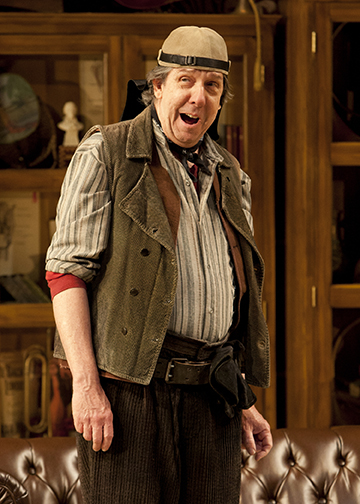
Shaw writes in his postscript to Pygmalion that Eliza's marriage to Freddy was inevitable for the transformed flower girl. What it adds is confusion over how Eliza and Higgins have been affected by the events that transpired. As she looks over her shoulder at Higgins, from the nuptuals conducted upstage, he is slouched in his chair, seemingly unaffected. To this she seems mildly perturbed.
And so, dramatically, the fine staging ends with a whimper rather than a bang. However, the ideas within Shaw's battle of the sexes, the classes, the dialects, remains engrossing. Higgins (Leonard) is on a regular listening-prowl, jotting down notes about the various identifying accents of his neighbors when his attention is drawn by a young flower girl, Eliza Doolittle (Parry). She reacts to his eavesdropping, but a Col. Pickering (Whitehead), just arrived to meet Higgins, introduces himself to the professor as a fellow student of linguistics. Higgins explains his interest in the power of speech to change lives, and insists Pickering stay with him to discuss their work.
The next day, Higgins' housekeeper, Mrs. Pearce (Taylor), ushers Eliza, who wants language lessons so she might raise herself from curbside flower seller to flower shop owner. Higgins wagers Pickering that an intense tutorial, in which Eliza stays there, will allow her to pass as royalty. While Eliza is shown her room, her father (Don Sparks) arrives to shake down the professor for his guardian's fee.
The lessons commence until she is ready for a trial run before Higgins' mother (Chappell) and several of the Eynsford Hills: Freddy (Robbie Simpson), his mother (Maggie Carney), and his sister Clara (Danielle O'Farrell). Mrs. Higgins is first to raise the question of what will become of Eliza once she is transformed in speech, but not in bearing.
The night of the ultimate test, a social event of international standing, occurs offstage, and we learn as Eliza, Higgins and Pickering arrive home afterwards that it has been a triumpph. But the men's treatment of her, as if she were little more than a prize-winner at a county fair, opens her eyes. Higgins recoils at her charges, reminding her that he has transformed her, and charged her nothing. "I sold flowers," she fires back. "I didn't sell myself. Now you've made a lady of me I'm not fit to sell anything else!"
It is another of the many "talking points" enmeshed in Shaw's work. The distinction with how what speaks and what one says is an underlying subtext of the play. That Eliza is missing the educated, classist way of speaking, while Higgins is missing the humanist ability to empathize, is another. What we would like to see, and what we get in the beloved musical, which Shaw loved, too, is a song of affection by Higgins. That is missing in the play, and it certainly strays from the original myth of Pygmalion, who asked the Gods to allow him to turn a statue, Gallatea, into a real woman. Higgins' only love is for his work, perhaps for himself. In essence he may be closer to Shaw than Pygmalion.
Leonard offers a decidedly American Higgins. It is a good choice, and one that makes the phonetics professor feel familiar to our audiences. Easy in bearing, not the stiff upper class snob one might assume from his breeding, he can be understood as preoccupied with his scholarship. As Shaw writes in his postscript, Higgins is quite content to have his mother's care as the feminine presence in his life. His work is his passion, and he is without interest in sex.
Parry is a stellar actress, and this performance is solid, if undistinguished. Not her fault. Some of the cuts may have limited her moments to be more than moulding clay. Others are allowed more variety and stand out more. The most noticeable is Sparks (inset photo, who gives Alfred Doolittle the right mix of pride and poverty. Content with his station, he also is thrust into society by another chain of events. Chappell and Taylor are also delightful, but to see Paxton Whitehead performing Shaw is a historic delight. In a play about speech, his every utterance is a confirmation of its power.
top of page
PYGMALION
by GEORGE BERNARD SHAW
directed by NICHOLAS MARTIN
THE OLD GLOBE
January 12-February 17, 2013
Opened 1/17, rev’d 2/9e
CAST Erin Elizabeth Adams, Maggie Carney, Kandis Chappell, Jeremy Fisher, Adam Gerber, Allison Layman, Robert Sean Leonard, Danielle O'Farrell, Charlotte Parry, Robbie Simpson, Don Sparks, Deborah Taylor, Paxton Whitehead
PRODUCTION Alexander Dodge, set; Robert Morgan, costumes; Philip S. Rosenberg, lights; Drew Levy, sound; Mark Bennett, music; Jan Gist, voice/dialects; Annette Yé, stage management
HISTORY Shaw completed Pygmalion in 1912, and showed it to Mrs. Campbell, hoping she would star in it. She agreed, but fell ill before the production could be mounted. As a result, the play's world premiere occurred in Vienna, in a German translation, in Fall 1913. Next was the American premiere in March 1914, and finally, a London production, starring Mrs. Campbell, came several weeks later.


